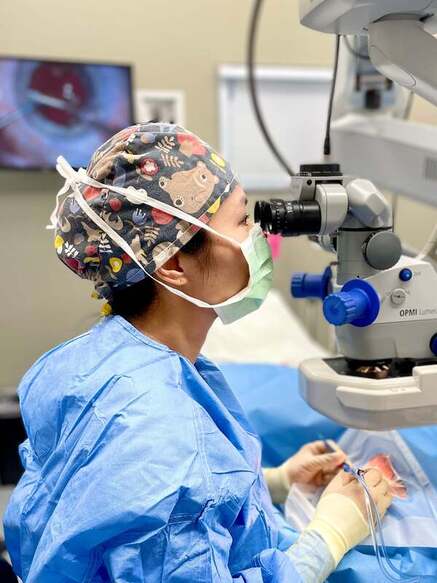The Significance of Normal Eye Tests: Insights From a Seasoned Optometrist
Normal eye tests work as a crucial component of healthcare that extends beyond mere vision correction. A skilled ophthalmologist can supply understandings right into just how these examinations not just detect typical eye problems but also reveal underlying health and wellness problems that might or else go undetected. The silent progression of conditions such as glaucoma and macular degeneration underscores the requirement of very early detection. Recognizing the regularity and relevance of these assessments can eventually influence one's lasting wellness trajectory, elevating the inquiry of how frequently individuals should prioritize their eye wellness in the context of overall wellness.
Advantages of Regular Eye Examinations
Although many individuals may ignore the value of regular eye examinations, these analyses play a vital role in preserving overall wellness and well-being. Routine eye evaluations offer not only to analyze vision yet also to spot very early indications of systemic health problems, consisting of diabetes and high blood pressure. By identifying these conditions at their inception, individuals can get timely interventions, significantly improving long-lasting outcomes.
Additionally, eye examinations can aid in keeping track of existing health problems, making sure that any type of adjustments in vision or eye wellness are promptly dealt with (optometrist). The evaluations enable tailored referrals regarding eyewear, lifestyle modifications, and protective steps against potential eye strain or damage
Beyond physical health, the benefits of regular eye exams extend to enhancing quality of life. Improved vision helps with much better efficiency in day-to-day tasks, from reviewing to driving, thereby adding to greater independence and safety. Ultimately, prioritizing eye examinations promotes an aggressive strategy to health administration, encouraging people to organize their health. Normal examinations are a crucial part of a comprehensive healthcare strategy, guaranteeing that both vision and overall wellness are protected throughout life.
Common Eye Issues Detected
Normal eye examinations contribute in spotting a variety of typical eye conditions that can substantially impact vision and total wellness. Among the most widespread problems determined during these evaluations are refractive errors, including myopia (nearsightedness), hyperopia (farsightedness), and astigmatism. These conditions usually manifest as obscured vision and can be conveniently fixed with prescription glasses or get in touch with lenses.
In addition, cataracts, which create clouding of the lens, are often identified in older adults. This condition can cause decreased vision and requires medical treatment for resolution. One more common problem is glaucoma, a group of eye illness that harm the optic nerve, typically connected to raised intraocular pressure. Early detection is vital as it can prevent irreversible vision loss.
Age-related macular deterioration (AMD) is another considerable problem that influences central vision, especially in individuals over 50. Ultimately, diabetic retinopathy, a difficulty of diabetes, can bring about severe vision disability otherwise monitored routinely. With thorough eye tests, these problems can be recognized early, enabling for timely monitoring and therapy to protect vision and enhance lifestyle.
Relevance of Early Detection
Early detection of eye conditions plays an important role in maintaining vision and avoiding significant wellness difficulties. Lots of eye diseases, such as glaucoma, diabetic person retinopathy, and age-related macular deterioration, can reference progress silently without recognizable signs and symptoms in their onset. By the time symptoms show up, irreparable damage may have occurred, leading to irreversible vision loss.
Normal eye examinations help with very early medical diagnosis, permitting timely treatment and therapy. As an example, treating raised intraocular stress can stop the beginning of glaucoma, while managing blood sugar levels can considerably reduce the threat of diabetic person retinopathy. Furthermore, problems like cataracts can be properly handled with medical treatment when identified early.

Just How Often Should You Visit?
Identifying the frequency of eye examinations is crucial for keeping optimum eye health and vision. The basic referral for adults is to have a detailed eye examination every one to two years, depending upon specific danger aspects and age. For individuals matured 18 to 60, an examination every 2 years is normally adequate if no vision issues are present. Nevertheless, those over 60 should think about yearly tests, as the risk of age-related problems raises considerably.
Individuals with particular danger variables, such as a family members background of eye disease, diabetes, or existing vision troubles, might require even more constant examinations. Kids should have their initial eye test at 6 months old, followed by added examinations at age three and prior to going into school. Normal exams during childhood years are critical as vision can transform swiftly during developing years.
Inevitably, the regularity of check outs ought to be tailored to each individual's conditions, including lifestyle, work-related hazards, and any kind of pre-existing eye conditions. Consulting useful source with an eye treatment professional can supply customized referrals, guaranteeing that your eye health is regularly kept an eye on and maintained.
Tips for Your Eye Examination
Planning for your eye exam can improve the effectiveness of the check out and make certain a complete evaluation of your eye health and wellness. To optimize your time with the eye doctor, it is important to collect relevant information before your appointment. Begin by assembling a list of any type of medicines you are presently taking, consisting of over the counter medications and supplements, as these can influence eye health.
Furthermore, document any symptoms you have experienced, such as blurred vision, discomfort, or headaches. This details will certainly aid your eye medical professional in detecting possible concerns.
It is likewise valuable to have a family members background of eye problems available, as genetic aspects can add to your eye health. Lastly, take into consideration arranging your test temporarily when you are much less rushed, allowing you to ask questions and review your worries completely. By preparing appropriately, you make certain that your eye test is productive and that your eye physician has all the essential info to provide the very best care feasible.

Verdict
Routine eye examinations play a crucial duty in preserving both vision and overall wellness. They assist in the early discovery of various eye problems and systemic issues, permitting timely treatment. The suggestions for regularity highlight the relevance of aggressive care. Applying easy primary suggestions can boost the evaluation experience. Inevitably, prioritizing comprehensive eye examinations adds substantially to the conservation of vision and the enhancement of lifestyle, highlighting the requirement of regular eye care in precautionary healthcare methods.
Regular eye exams are important in detecting a range of typical eye problems that can significantly influence vision and overall health and wellness.Establishing the regularity of eye exams is important for preserving optimum eye wellness and vision.Preparing for your eye test can boost the effectiveness of the check out and make certain a thorough evaluation of your eye health and wellness (optometrist). By preparing sufficiently, you make certain that your eye examination is productive and that your eye doctor has all the needed information to offer the best care feasible
Inevitably, prioritizing extensive eye assessments contributes dramatically to the conservation of vision and the improvement of top quality of life, highlighting the necessity of regular eye treatment in precautionary health care techniques.